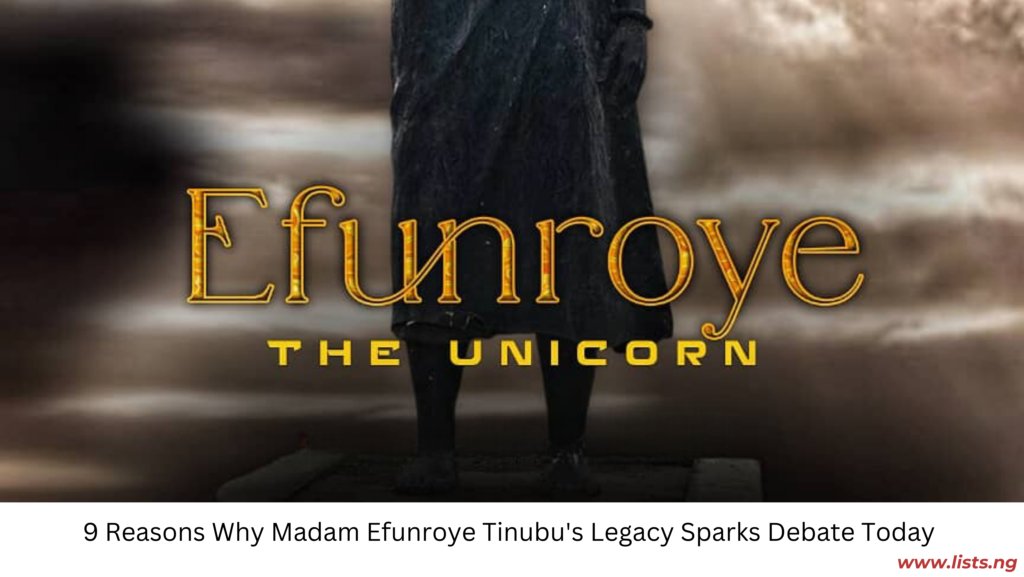At the time of writing, the internet has been buzzing with heated discussions surrounding “Madam Efunroye Tinubu,” the formidable 19th-century Nigerian businesswoman and political figure, thrust back into the spotlight by Nollywood actress Faithia Williams. Williams recently teased her upcoming film, Efunroye: The Unicorn, reigniting debates about Tinubu’s legacy.
The controversy surrounding Madam Tinubu is understandable, given that her life was characterized by both significant achievements and morally complicated choices. While some believe she is not deserving of celebration, others see her as a trailblazer and argue that there should be no issue in making movies about such a figure.
In this piece, we’ll unpack her life and legacy to understand why she remains such a divisive figure.
Early Life and Rise to Prominence
Madam Efunroye Tinubu was recognized for her wealth, influence, and significant role in West African politics. Born around 1810, in the Egba ethnic group, was originally named Efunporoye Osuntinubu.
She married a local man and had children, but her first significant rise began after the death of her first husband. She later married Adele Ajosun, a prince of Lagos, and moved with him to Badagry during his exile. This marriage granted her access to political power and influence within Lagos, and she started building her wealth through extensive trade.
Business Acumen and Wealth
Tinubu amassed considerable wealth by engaging in diverse commercial ventures, primarily trading slaves, tobacco, salt, and firearms between Lagos, Abeokuta, and European merchants along the coast. She became highly successful in the Atlantic slave trade before its eventual abolition, leveraging her political connections and resources to dominate trade routes and markets.
After the death of Adele Ajosun, Tinubu returned to Abeokuta and expanded her influence further by becoming involved in the kola nut and gun trade, often leveraging her wealth to strengthen her political position.
Political Influence and Legacy
Tinubu was not only a shrewd businesswoman but also a deeply political figure. In Lagos, she formed a close relationship with Oba Dosunmu, ruler of Lagos, and played a critical role in the politics of the city-state. She used her wealth and power to support her own causes, including the expulsion of British officials who she believed undermined the sovereignty of Lagos and the traditional power structures.
Involvement in the Slave Trade
One of the most criticized aspects of Madam Tinubu’s legacy was her deep involvement in the slave trade. Like many African elites of her time, Tinubu participated in the selling of enslaved people to European traders. She amassed significant wealth by trading slaves along with other goods like tobacco, salt, and firearms. Even as the British colonial government began to push for the abolition of the slave trade, Tinubu was resistant and continued her involvement in this morally and ethically condemnable practice.
When the British enforced anti-slavery laws in Lagos, Tinubu, along with others, clashed with colonial officials because she viewed the abolition of the slave trade as a threat to her wealth and economic power. Her opposition to the British was rooted, in part, in her desire to protect her financial interests in the slave trade.
Conflict with British Colonial Authorities
While Tinubu is often lauded for resisting British colonialism, her defiance was also driven by her economic interests, particularly around maintaining the slave trade and protecting her dominant position in commerce. She used her wealth and political power to undermine British colonial efforts, which had the goal of enforcing the abolition of the slave trade and implementing new governance in Lagos.
Her opposition to British authority resulted in her eventual exile from Lagos in 1856. While some view this as a courageous stand against imperialism, others argue that her resistance was primarily self-serving, focused on preserving her business interests, including those tied to the human exploitation of the slave trade.
Allegations of Ruthlessness in Power
Madam Tinubu was recognized for her determination and ambition, though historical records indicate she could be relentless in securing her power. She was deeply involved in political conflicts and power struggles in both Lagos and Abeokuta. As her influence grew, she used her wealth, connections, and military strength to safeguard her interests and overcome her rivals.
Some accounts suggest she wasn’t hesitant to use manipulation and force to eliminate political opponents, portraying her as a leader who would do whatever it took to control trade routes, resources, and political influence.
Impact on Local Communities
Madam Tinubu’s participation in the slave trade had a severe and damaging effect on local communities. Like other African elites involved in the transatlantic trade, her actions played a role in the loss of freedom and displacement of countless Africans. Although such practices were common among local leaders at the time, it remains a significant and controversial aspect of her legacy, especially when viewed from a modern perspective.
Resistance to British Anti-Slavery Efforts
Even after the British established their colonial administration in Lagos, Tinubu continued to oppose the imposition of anti-slavery policies. Her actions sometimes created political instability in Lagos and led to her exile by the British authorities in 1856. This exile came as a result of her resistance to the British move to end the local slave trade. Rather than embracing this change, Tinubu fiercely fought to preserve her role in this exploitative industry.
Historical Context
It’s important to acknowledge that Tinubu’s actions took place in 19th-century West Africa, where the slave trade was a major source of wealth for many powerful elites. Although her role in the trade is now viewed with strong moral condemnation, it was a lucrative enterprise at the time, and many African leaders participated, despite its devastating human impact. Madam Efunroye Tinubu’s legacy is complex: she is remembered as a strong leader and a symbol of resistance to colonialism, but her wealth and influence were also built on exploitation and political ambition. Like many historical figures, her story reflects both positive and negative aspects.
She passed away in 1887, leaving behind a lasting influence as one of Nigeria’s most notable women, despite the complexities of her legacy.
Social Media Reactions
The internet has been buzzing with mixed reactions since the announcement of Faithia Williams’ upcoming movie about Madam Tinubu. Many viral opinions have surfaced, questioning whether she is truly a figure worth celebrating. One prominent critic is media personality and activist David Hundeyin, along with others who have voiced similar concerns. Some have also drawn connections between her last name and Nigeria’s current president, Ahmed Bola Tinubu, adding another layer of debate to the conversation.
Wrapping Up,
With the ongoing discussions, it remains to be seen whether the movie will fully capture Madam Tinubu’s complex character, addressing all aspects without leaving anything out.
Stay tuned for its release.



